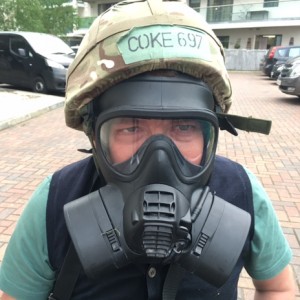We’re here because we’re here lad..

I often sit at my kitchen table, after a another night of painful spasms, broken sleep and the effects of an enveloping fog, clouding my senses. Multiple Sclerosis has an excellent ability to knock you down, especially the progressive forms. These exhausting night time skirmishes in my battle against the disease take no prisoners. But like any good soldier, I fight adversity, hold the line and remember, I’m here because I’m here, and deal with what is before me.
Anyone living with MS (120k in the UK) know its cluster fuck of symptoms, have the ability to make life hell. The sword of Damocles weighs heavy especially for those living with the Remitting Relapsing form, which initially affects 85% of sufferers, not knowing which path the disease will take and people are right to fear it. A recent survey by the Sue Ryder charity of the top 10 diseases people dread the most, saw it riding high with other neurological diseases like dementia.
Punching well above its weight it saw off heart disease, diabetes and cancer even though their comparative patient numbers and associated deaths dwarf that of MS. Hammering home its top facets of fear of the unknown, disability and the loss of independence, MS is a mighty adversory. Put it another way if Waddington’s manufacturer of the iconic Top trumps card game, had produced a disease version, then drawing MS would have been akin to picking a Tiger tank in the military equivalent – virtually unplayable.
In many ways living with my progressive form, which has confined me to a wheelchair is easier. It is more like a long drawn out war of attrition. I know where the attacks will be coming from, but I’m unlikely to wake up blind or paralysed from the neck down. It means I don’t live in fear of it and can adapt to given changes as they occur. Obviously the long term prognosis could be better – it will probably be a brutal fight to the death, but in many ways I count myself lucky.
For many years I worked for a local disabled charity and also helped out in an old peoples home, it helped put things in perspective. I met so many people, young and old who lived with many diseases and ailments and my own issues with MS took second fiddle. I’ve always been a ‘no glass is big enough’ kind of guy, and embracing and engaging kids with awful disabilities and old ladies with porous brains broken by dementia, was equally humbling as it was rewarding.
The experience helped me grow above my own misgivings about MS as I helped others climb their own mountains, if anything drawing from their strength to help me get to the top of my own. It’s something I’ve been passionate about ever since. At the moment I’m working with a mate who is a film maker, producing live streaming of events. He also lives with epilepsy and Type 1 diabetes. Both of us are acutely aware of our health limitations, equally though we are driven to breaking down the barriers in society, that look on disability with eyes wide shut and ignore the time bomb of bad life style choices.
Julien’s experience of it is different to mine. Sudden seizures can cause immediate unconsciousness, dangerous falls and irrational behaviour and then he’s got the diabetes on top – but all disabled people have their own story and monkey to carry. A recent study by the Papworth Trust painted a bleak picture. It found disabled people were less likely to be employed, faced increasing financial hardship and were still misunderstood by the general public.
Hopefully we won’t return to a bygone era, forced to eek out an existence with our ‘Hand-in-cap’ or institutionalised in the funny farm. But all jokes aside, society’s ‘benevolent prejudice’, towards the disabled will only disappear, when it conquers its own hidden fears, creating a level playing field for all.
Of the estimated 12 million disabled people, only 17% were born with their impairment, meaning the rest is in the post for us and future generations – no-one is immune. Increased levels of mental health (1/4 people) and an aging population, will see these figures increase and continued inertia will only serve to worsen further hardship.
For all the amazing Paralympian’s and heroic serviceman blighted by cannon fire, there are countless others with a plethora of disabilities and diseases living it out in their own no mans land, fighting their own private war, waiting for that bugle call to charge. Society embracing, respecting and giving better opportunity and choice to all those soldiers, would go a long way to limiting the casualties of the future.
A very well written piece by someone who “has been there” and inspiring for those who still need convincing that life can go on after the onslaught of any horrible disability. I hope the piece is able to be more widely publicised for those that do not yet follow your work.